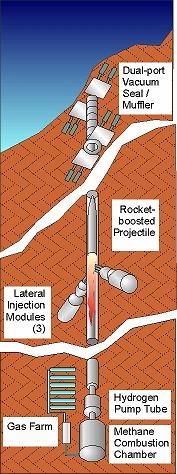
Home - Search - Browse - Alphabetic Index: 0- 1- 2- 3- 4- 5- 6- 7- 8- 9
A- B- C- D- E- F- G- H- I- J- K- L- M- N- O- P- Q- R- S- T- U- V- W- X- Y- Z
Jules Verne Launcher
 Jules Verne Launcher |
Status: Design 1996. Payload: 3,300 kg (7,200 lb). Apogee: 185 km (114 mi).
The company planned to first build a prototype Micro Launcher system. This would fire 1.3 mm projectiles (barely visible to the naked eye) and demonstrate several new technologies, including the use of three pairs of supplemental gas injectors along the barrel (as used in the Oberth gun and V-3). The full-scale gun would be bored into a mountain in Alaska for launches into high-inclination orbits. The gun would have a muzzle velocity of 7 km/second and fire 5,000 kg projectiles. The payload would be 1.7 m in diameter and 9 m long. Following burn of the rocket motor aboard the projectile, a net payload of 3300 kg would be placed into low earth orbit.
SHARP experience indicated maximum fire rate of the gun would be once per working day. A single gun could orbit over 1000 metric tons a year into orbit at a cost per kg one-twentieth of conventional rocket launchers. The economic breakeven point was calculated to be between the first 50 and 100 launches.
Payloads would be subjected to accelerations of about 1,000 G's during launch, so Hunter recruited specialists to design prototype hardened satellite systems. JVL was apparently still operating in 1998, but no investors came forward to finance the multi-billion dollar development cost.
LEO Payload: 3,300 kg (7,200 lb) to a 185 km orbit at 60.00 degrees. Launch Price $: 2.000 million in 1996 dollars.
Family: Gun-launched, orbital launch vehicle. Country: USA. Bibliography: 463.
1996 - . Launch Vehicle: Jules Verne Launcher.
- Jules Verne Launcher Company founded - . Nation: USA. The company proposed commercial funding of a super light gas for launches into high-inclination orbits. JVL was apparently still operating in 1998, but no investors came forward to finance the multi-billion dollar development cost..
Back to top of page
Home - Search - Browse - Alphabetic Index: 0- 1- 2- 3- 4- 5- 6- 7- 8- 9
A- B- C- D- E- F- G- H- I- J- K- L- M- N- O- P- Q- R- S- T- U- V- W- X- Y- Z
© 1997-2019 Mark Wade - Contact
© / Conditions for Use